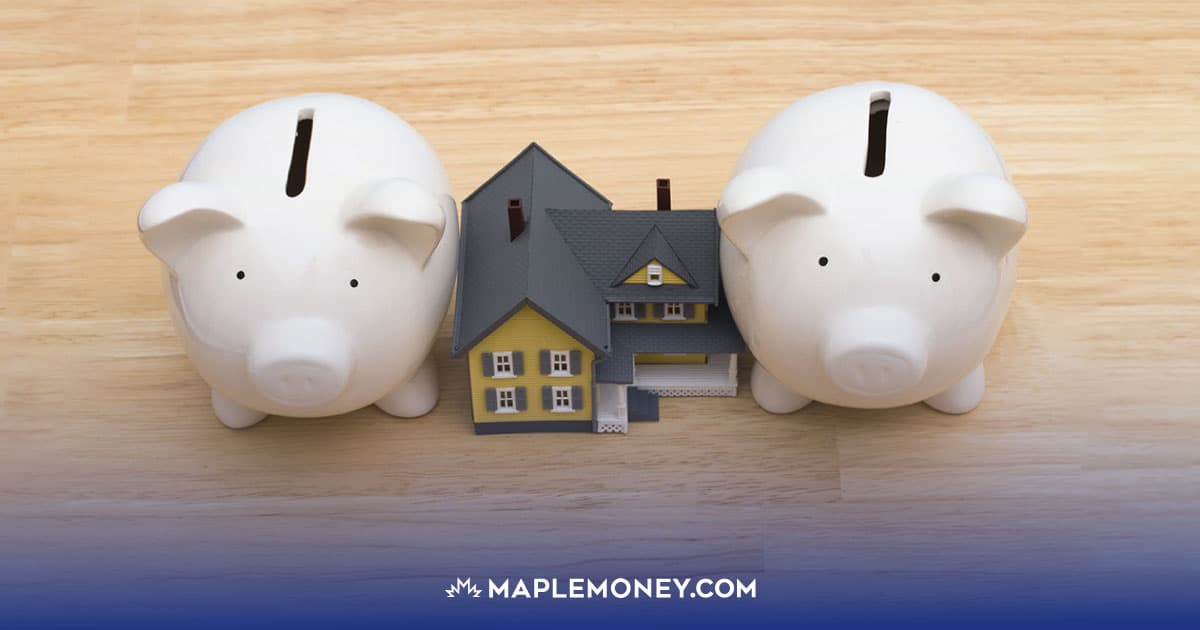What Should You Do First: Pay Off Debts or Save?

When managing your finances, you may wonder what to focus on: paying off your debt or saving money. It’s a challenging decision, and the right choice comes down to your situation.
In this article, I’ll help you weigh the options by letting you know when to pay off your debt, when to save first, and why building an emergency fund is the best first step for most people.
Should You Save First or Pay Off Debt?
While everyone’s situation is different, most people should prioritize building an emergency fund. One of the biggest roadblocks to getting out of debt is not having enough money to pay for unexpected expenses with cash.
It’s why so many people fall into the credit card trap. You may have enough money to get from paycheque to paycheque, but the only option is to use your credit card when the car breaks down, and you need to get to work. Without an emergency fund, paying off your debt can feel like trying to bail water out of a leaky boat.
The one situation where I would focus on credit card debt before building a small emergency fund would be if you were over your credit limit. In that situation, your top priority should be to get your balance under the limit to avoid any extra charges or credit score issues.
Building An Emergency Fund
An emergency fund is a safety net that can help cover unexpected expenses, such as car repairs, medical bills, or job loss. While you may not be able to save this much right away, aim for 3-6 months’ worth of living expenses in a separate, easily accessible account.
Your emergency fund will ensure that you don’t need to borrow money or rely on credit cards in case of an emergency. Assuming you’ve built your emergency fund, let’s explore when you should make debt payments first and when you should save first.
When To Pay Off Debt First
If you have high-interest debt, like a credit card balance or payday loans, it’s usually a good idea to prioritize paying off your debt sooner before focusing on long-term savings goals. By first applying debt payments to the highest interest rate accounts – known as the “debt avalanche” method – you can free yourself from excessive interest charges and reduce your overall debt more quickly.
This strategy not only helps you save money in the long run but will also help you improve your credit score, increasing your chances of qualifying for personal loans or mortgages in the future.
When To Save First
There are instances when saving first may be the preferable option. If you make more than the minimum payments on your debts and have a manageable interest rate, you may feel comfortable focusing on savings.
This is particularly true if you have life goals requiring immediate funding, like saving for a down payment on a home or planning a significant event such as a wedding or vacation.
This approach requires a balance between saving money and paying off debt. By understanding your situation and being strategic, you can work towards a debt-free future.
How to Balance Saving With Paying Off Debt
Striking the right balance between saving and paying off debt is challenging. Here are some steps to take to help you arrive at the right decision:
- Create a budget to understand your expenses and monthly income. Knowing how much extra money you have will enable you to allocate funds toward your savings and debt repayment in a way that best fits your situation.Divide your expenses into essential (rent, utilities, food, etc.) and non-essential categories to determine where to cut back. If you can find some extra money, you can use the funds to save and pay down debt.
- Build an emergency fund. If you don’t already have one, your first step should be building savings in an emergency fund to protect you from unexpected expenses that may force you to borrow more money and add to your debts.Aim to save enough money to cover at least three to six months of essential expenses. This will provide you with a buffer in case of a job loss, medical emergency, or any other unforeseen financial situation.For many, saving three to six months’ worth of income will take time. Set goals along the way. Aim to set aside $500, then $1000, then $2000, and so on.
- Prioritize your debts by listing them according to interest rates, balances, and terms. When you’re ready, tackle the debts with the highest interest rates first while making the minimum payment on others; this will reduce your overall debt faster.Consider applying for a consolidation loan if you have numerous credit card balances. The new loan will allow you to merge multiple debts into a single debt payment, hopefully at a lower interest rate.
- Gradually increase your savings. You can move more money into savings as you get out of debt. Adjust your budget as your financial goals and situation evolve, and review your strategy often.
Balancing debt repayment and savings is a process that requires frequent reassessment, and you may need to make adjustments to your plan. Remember, finding the right balance that works for your unique situation is critical.
Final Thoughts
While everyone’s situation differs, I recommend that most people start with an emergency fund. From there, focus on paying off your high-interest debts first. As you progress, consider allocating some funds towards savings, and balance the two priorities accordingly.
And don’t be afraid to ask for help if you’re struggling to manage your debts or develop a solid repayment plan. A third party, such as a credit counsellor or financial advisor, isn’t as emotionally invested as you are and can help you make the most logical decision.
FAQs
Should I use my emergency fund to pay off my debt?
Using your emergency fund to pay off debt can be tempting, but I don’t recommend it in all but the most extreme circumstances. Your emergency fund is meant to be a safety net for unexpected expenses, such as medical emergencies or car repairs.
By using it to pay off debt, you risk leaving yourself vulnerable to potential emergencies that could push you further into debt. Instead, try to create a different plan for paying off your debt, like budgeting more intentionally or finding additional sources of income.
Is it better to clear credit card debt or save money?
If you’ve already set up an emergency fund, I recommend paying off high-interest debt, like credit card debt, before you put significant sums toward savings. As a tradeoff, you could prioritize your credit card payments while making small contributions to your savings. Once you pay off your high-interest debt, you can focus on growing your savings more aggressively.
What is the ideal amount of savings before focusing on debt?
The ideal amount of savings will vary from person to person, but a general rule of thumb is to build up an emergency fund that covers three to six months’ worth of living expenses. This cushion is enough to help most people avoid going further into debt if an unexpected expense or job loss occurs.


